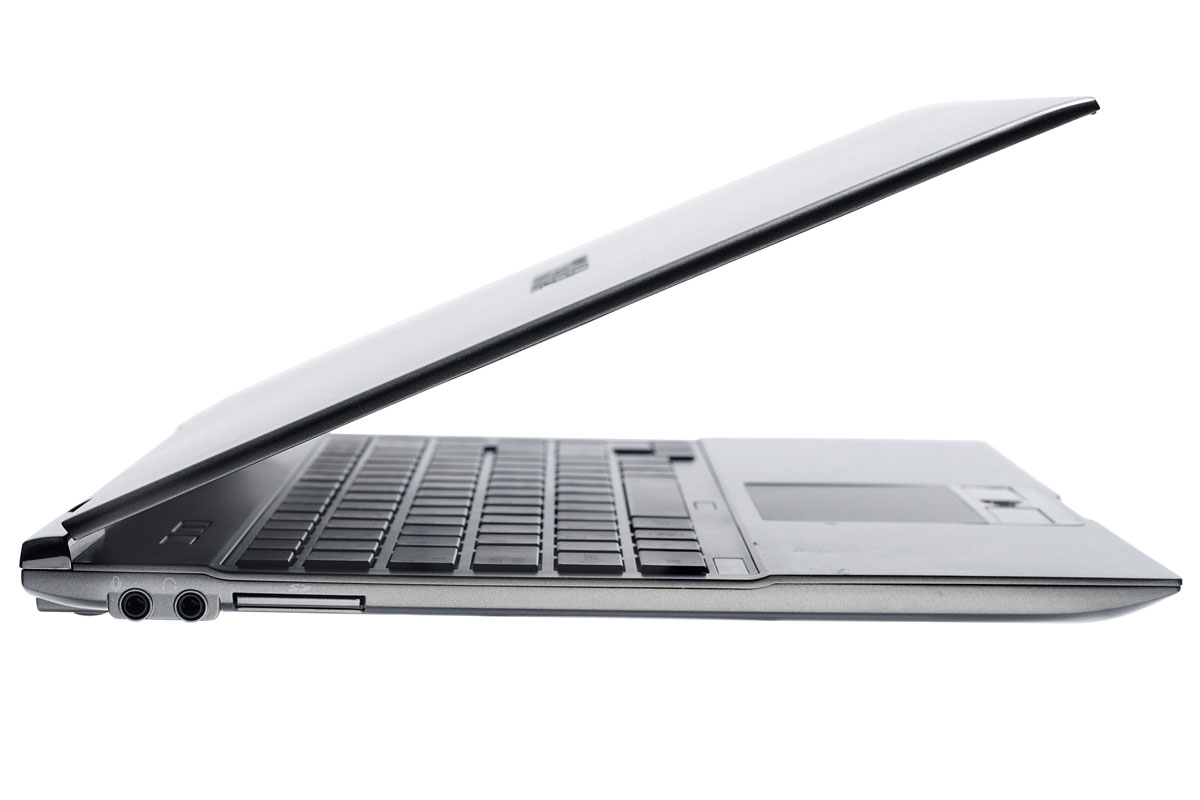Toshiba Portégé Z830-104 review
Ultrabooks are certainly desirable, but they aren't designed for the workplace – a point that Toshiba aims to correct with the Portégé Z830, an ultra-thin laptop aimed at businesses. Tom Morgan takes a closer look to see if it succeeds.
Although it has several unique features that are sorely missing in Ultrabooks from other manufacturers, the Z830 isn’t head and shoulders above its competition. No other manufacturer has managed to perfect the formula so far, but they all have selling points that make them more desirable than the Toshiba. If you're not beholden to Windows, the 13in MacBook Air, which is available with a similar specification to the Z830 at a similar price, is still our preferred ultra-portable laptop, but Ultrabooks are slowly catching up.

The SDHC slot is located on the side of the Z830 next to the headphone and mic connectors.
Toshiba installs the 64-bit version of Windows 7 Professional as standard on the Z830, as well as a host of OEM software. Face Recognition and Security Assist are the most useful, but unlikely to replace any security systems already in use by your company. BIOS controls are also fairly limited, but IT administrators will at least be able to password protect it to prevent any unwanted changes and it is compatible with the Computrace remote tracking service.
The Z830 gets a lot of things right, but it's not the perfect Ultrabook performance and screen resolution are both only average and the keyboard and touchpad leave a lot to be desired. The fairly wide selection of full-size ports are definitely welcome additions. Although the adapters used by other laptops aren't large or bulky, they are one more thing to forget and leave behind when you're in a rush.
Verdict
Although it has several unique features that are sorely missing in Ultrabooks from other manufacturers, the Z830 isn’t head and shoulders above its competition. No other manufacturer has managed to perfect the formula so far, but they all have selling points that make them more desirable than the Toshiba. If you're not beholden to Windows, the 13in MacBook Air, which is available with a similar specification to the Z830 at a similar price, is still our preferred ultra-portable laptop, but Ultrabooks are slowly catching up.
Processor: Intel Core i5-2557m, 1.7GHz Memory: 4GB 1,333MHz DDR3 RAM Graphics: integrated Intel HD Graphics Hard disk: 128GB SSD Display: 13.3in 1,366x768, LED-backlit screen Features: 0.3 megapixel webcam, integrated microphone Connectivity: 802.11b/g/n Wi-Fi, Bluetooth 3.0 Ports: 2x USB, 1x USB3, 1x SDXC card reader, 1x HDMI, 1x 3.5mm headphone, 1x 3.5mm microphone, 1x Gigabit Ethernet Dimensions: 16x316x227mm Weight: 1.12kg Warranty: one year RTB OS: Windows 7 Professional 64-bit Part code: PT225E-00800DEN BENCHMARK RESULTS Image editing 62 Video encoding 41 Multiple apps 43 Overall 46 Light usage battery life – 6h48m POWER CONSUMPTION Sleep 1W Idle 17W Active 42W
Sign up today and you will receive a free copy of our Future Focus 2025 report - the leading guidance on AI, cybersecurity and other IT challenges as per 700+ senior executives
-
 CISA’s interim chief uploaded sensitive documents to a public version of ChatGPT – security experts explain why you should never do that
CISA’s interim chief uploaded sensitive documents to a public version of ChatGPT – security experts explain why you should never do thatNews The incident at CISA raises yet more concerns about the rise of ‘shadow AI’ and data protection risks
By Ross Kelly Published
-
 Former Google engineer convicted of economic espionage after stealing thousands of secret AI, supercomputing documents
Former Google engineer convicted of economic espionage after stealing thousands of secret AI, supercomputing documentsNews Linwei Ding told Chinese investors he could build a world-class supercomputer
By Emma Woollacott Published
-
 OpenAI admits 'losing access to GPT‑4o will feel frustrating' for users – the company is pushing ahead with retirement plans anway
OpenAI admits 'losing access to GPT‑4o will feel frustrating' for users – the company is pushing ahead with retirement plans anwayNews OpenAI has confirmed plans to retire its popular GPT-4o model in February, citing increased uptake of its newer GPT-5 model range.
By Ross Kelly Published